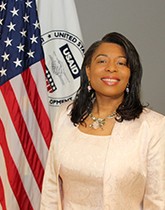- Who We Are
- Mission, Vision and Values
- Organization
- Leadership
- Office of the Administrator
- Bureaus
- Independent Offices
- Office of Afghanistan and Pakistan Affairs
- Office of Budget and Resource Management
- Office of Civil Rights and Diversity
- Center for Faith-based and Community Initiatives
- Office of Human Capital and Talent Management
- Office of Security
- Office of Small and Disadvantaged Business Utilization
- Office of the Executive Secretariat
- Office of the General Counsel
- Mission Directory
- Staff Directory
- Advisory Committee
- Board for International Food and Agricultural Development
- Mission Directors
- Coordinators
- Global Development Council
- USAID History
- Operational Policy (ADS)
- Transparency
- Resource Portal

Maria Price Detherage is the Director of the Office for Civil Rights and Diversity (OCRD) at the US Agency for International Development (USAID). She is the Agency’s Chief Diversity Officer and Settlement Official on informal and formal equal employment opportunity (EEO) complaints. She also serves as the Co-Chair of USAID's Executive Diversity Council alongside USAID’s Deputy Administrator, working to promote diversity and inclusion throughout the Agency.
Previously, Maria served as USAID’s Deputy Chief Human Capital Officer (DCHCO), partnering with critical stakeholders to develop and implement innovative and transformational human resource policies, procedures, and programs that serve all staff, including Foreign Service and Civil Service personnel.
Before joining USAID, Maria was the Director of the U.S. Department of Health and Human Services’ (HHS) Strategic Programs Directorate and the DCHCO. In 2005, Maria was appointed by then HHS Secretary, Michael O. Leavitt, to serve as the first Executive Director for the Office of Medicare Hearings and Appeals (OMHA). As the Executive Director for OMHA, Maria provided executive leadership, guidance and oversight in the areas of management ranging from policy development and implementation on Medicare appeals procedures, to human capital, ethics, personnel security, training and development, national policy, budget, IT, and presidential mandates.
Maria also previously served as the Director of Labor and Employee Relations Programs for HHS, providing corporate oversight for the labor and employee relations policies and programs at HHS. She was intricately involved in the planning, strategy, and execution of the Department’s major initiatives. While at HHS, Maria authored the “HHS Rural Outreach Strategy” as part of her Senior Executive Service (SES) Candidacy Development Program rotation with the HHS Office of Intergovernmental Affairs and White House Liaison. In addition, she served as a mentor to participants in the HHS Senior Executive Service (SES) Candidate Development Program, Emerging Leaders Program, and Department-wide Mentor Program.
She began her federal career in 1989 as a Graduate Fellow in HHS’s Center for Management Excellence where she served as an internal consultant to the Department’s policy arm on Equal Employment Opportunity and Labor Relations.
Maria became a member of the SES Corps in 2005 and is also a member of the Federal Executive Institute Alumni Association, Harvard Kennedy School of Executive Education Alumni, the American Association of Arbitrators and Alpha Kappa Alpha Sorority, Incorporated, where she served as chair of the Global Poverty Committee. She has been recognized in the “1999 Edition of “International Who’s Who of Professionals” and has served for many years on the Executive Board of the Executive Women’s Golf Association, Southern Maryland Tri-County Chapter, as Vice President and Leadership Chair. Prior to joining USAID, Maria was awarded the “2013 International Women’s Day Award” for her local and international work in global poverty. In addition to being a federal public servant, she considers herself a global citizen, global volunteer, and a social entrepreneur. In a 2016 interview at the White House’s FedWomenLead Executive Program, she summed up her personal thoughts on public service by saying, “Being a public servant means being able to give the best of me to ensure the best for others, all across the globe. For me, it’s that simple.”







Comment
Make a general inquiry or suggest an improvement.